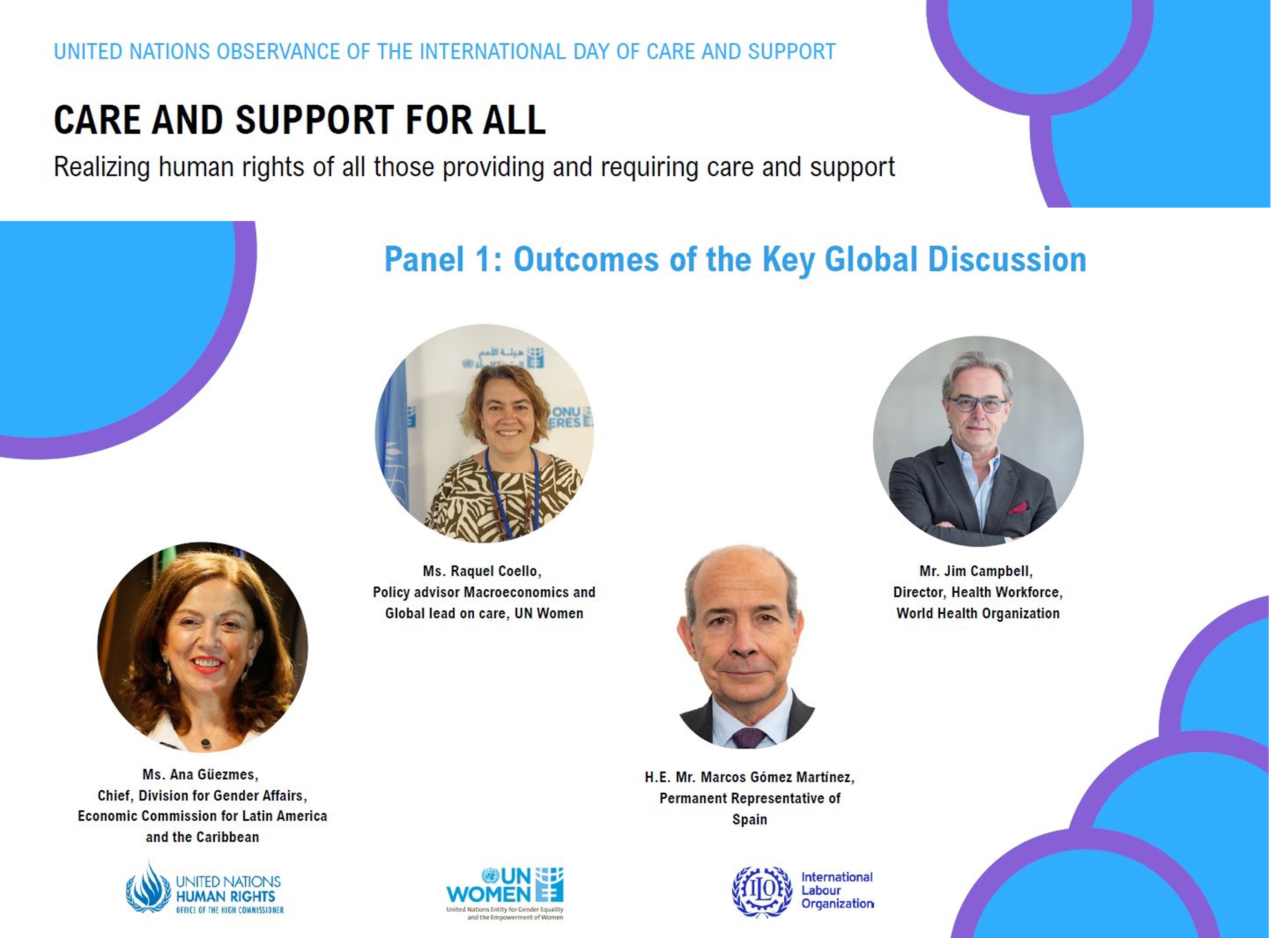ECLAC called for placing the right to care at the center of public policies during the United Nations International Day of Care and Support commemoration
Work area(s)
Topic(s)
During the third United Nations International Day of Care and Support, held in Geneva, Ana Güezmes, Director of the Division for Gender Affairs of ECLAC, underscored the historic opportunity represented by the care society proposal that Latin America and the Caribbean brings to the world as a new paradigm for sustainable development, equality and peace, one that places the sustainability of life and the care of people and the planet at its core.

29 October 2025. During the third Commemoration of the International Day of Care and Support, held at the Palais des Nations in Geneva, Ana Güezmes, Director of the Division for Gender Affairs of the Economic Commission for Latin America and the Caribbean (ECLAC), participated in the first segment: Outcomes of the main global debates. The event was organized by the Office of the United Nations High Commissioner for Human Rights (OHCHR), the United Nations Entity for Gender Equality and the Empowerment of Women (UN Women) and the International Labour Organization (ILO).
The session was opened by Dimiter Chalev, Chief of the Equality and Non-Discrimination Branch of OHCHR, and moderated by Ana Moreno from the Technical Secretariat of the Global Alliance for Care. The first segment, dedicated to the outcomes of the main global debates on care, featured contributions from Ana Güezmes, Director of the Division for Gender Affairs of ECLAC; Raquel Coello, Senior Advisor on Macroeconomics and Global Lead on Care at UN Women; Jim Campbell, Director of the Health Workforce Department of the World Health Organization (WHO); and Ambassador Marcos Gómez Martínez, Permanent Representative of Spain to the United Nations in Geneva.
Ana Güezmes emphasized that “we are facing an unprecedented global opportunity. Care has become a central issue in international debates, ranging from human rights to health, labour and climate action. The care society proposal that Latin America and the Caribbean brings to the world is a new paradigm for sustainable development, equality and peace, one that prioritizes the sustainability of life and the care of people and the planet, as recognized by the recently adopted Tlatelolco Commitment during the XVI Regional Conference on Women in Latin America and the Caribbean. This agreement launches a Decade of Action (2025–2035) towards gender equality and the care society through transformations in political, economic, social, cultural and environmental spheres.”
She further stressed that “care is a growing need throughout the life cycle, a human right, a global public good and essential labour that drives the economy as a whole.”
Along these lines, she highlighted that the Inter-American Court of Human Rights set a historic precedent by becoming the first international tribunal to pronounce on the content and scope of the right to care and its interrelation with other rights, in its Advisory Opinion No. 31 (2025), adopted on 12 June 2025. This pronouncement recognized care as an autonomous human right and underscored the obligation of States to guarantee its effective exercise through appropriate public policies, services and infrastructure.
She concluded by reaffirming that “investing in care is not a cost; it is essential investment for achieving gender equality and a foundation for resilience, sustainability and democratic transformation.”
The event also featured the segments Perspectives of different stakeholders on progress and gaps in 2025 and National and regional progress and challenges faced, with participation from representatives of the United Nations Children Fund (UNICEF), the International Trade Union Confederation (ITUC), the Confederation of Danish Employers, the International Organisation of Employers (IOE), the International Federation on Ageing (IFA), the NGO Committee on Ageing in Geneva, the Working Group on Discrimination against Women and Girls, the Committee on the Rights of Persons with Disabilities, and the Permanent Missions of South Africa, Mexico, Bangladesh and the Republic of Moldova to the United Nations.
Ana Güezmes concluded her intervention by emphasizing that ECLAC will continue to support Latin America and the Caribbean in advancing the implementation of comprehensive care policies that recognize this human right and contribute to more equal, sustainable and people-centered development.